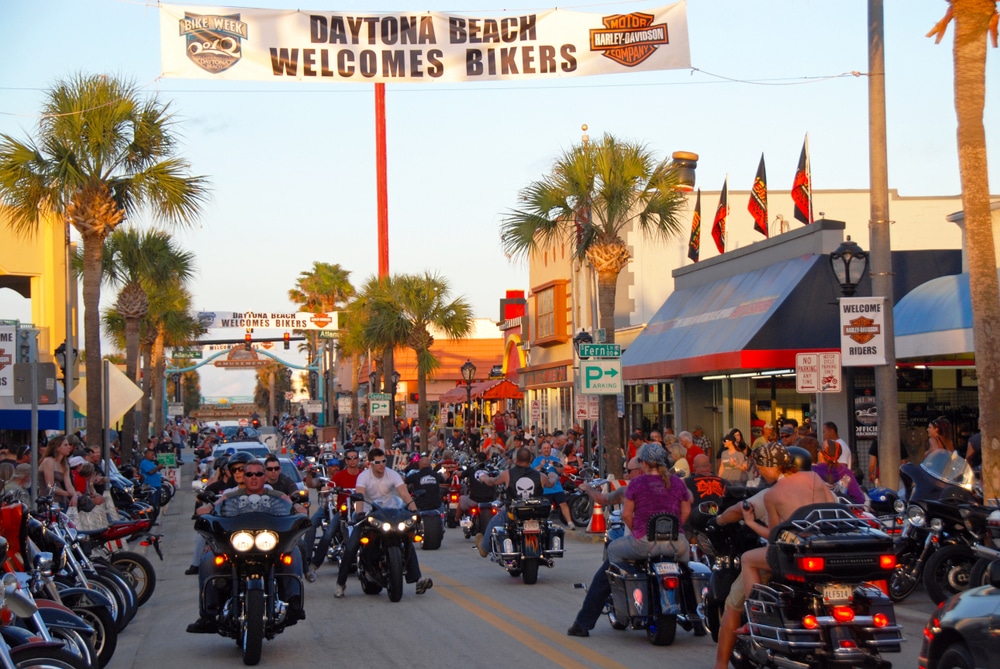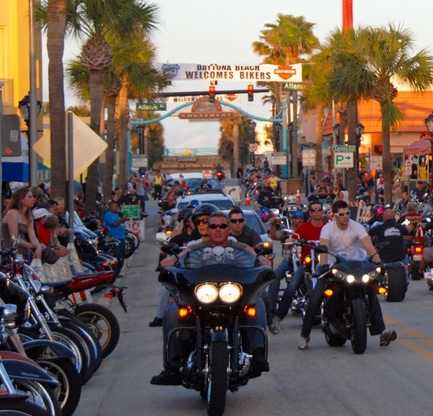
Nothing beats two-wheeling up and down the Florida coast on a motorcycle.
Because we’re lucky enough to enjoy warm temps throughout the year, riding a motorcycle is more than a hobby for many Floridians. We commute to and from work. We love our motorcycle events.
And occasionally, we get into a few scrapes. Which is where Florida’s motorcycle laws come in.
Indeed, the popularity of motorcycles in the Sunshine State has created a thriving practice for attorneys who understand Florida’s traffic accident laws as they pertain to motorcycles.
It may not be a question of IF you will be in an accident—it’s a question of WHEN. So let’s take a look at the motorcycle laws you need to know about.
Table of Contents
- What Are The Local Laws Affecting Motorcycle Riders?
- Do Bikers In Florida Have To Wear Helmets?
- What Are the Insurance Requirements for Motorcycle Owners?
- Do I Need an Endorsement?
- What Are Florida’s Motorcycle Laws for Riding?
- Does Florida *Really* Not Require Me to Wear a Helmet?
- What Tags Does Florida Motorcycle Law Require?
- Does No-Fault Apply to Motorcycles in Florida?
What Are The Local Laws Affecting Motorcycle Riders?
State legislators pass laws to protect motorcyclists, as well as cyclists, pedestrians, and “cagers.” To better understand the statutes motorcycle owners must follow, we break down motorcycle laws in the state into six broad categories.
- Insurance
- Endorsement
- Riding
- Helmet
- Tags
- No-Fault Liability

Do Bikers In Florida Have To Wear Helmets?
Nope! But we DO have to wear some sort of eye protection (like sunglasses), and under 18 y/o have to wear a helmet.
What Are the Insurance Requirements for Motorcycle Owners?
Motorcycle operators in Florida have to carry insurance if they are over 21 years old and they choose not to wear a helmet. If you decide to ride a bike without wearing a helmet, you need to purchase the following coverage:
- $10,000 medical payments coverage
- $10,000 bodily injury liability coverage per person
- $20,000 bodily injury liability coverage per accident
- $10,000 property damage liability insurance
Do I Need an Endorsement?
What Are Florida’s Motorcycle Laws for Riding?
Florida prohibits motorcycle riders from lane splitting, which represents the dangerous practice of passing another vehicle using the same lane. Riders also cannot operate a motorcycle between lanes by passing cars on each side. Motorcycle law states you cannot carry more than two people, as well as requires you to use headlights even during daylight hours. If you fail to turn on your headlight and then get involved in an accident, you might be held liable for causing the injuries sustained by the other party. The state bans all forms of stunt driving, including drag racing and jumping between two ramps. Both wheels must always remain on the ground—even on sandy beaches and when operating a motorcycle on off-road trails. Motorcyclists are banned from passing vehicles on the right side of a road or highway. Florida law forbids the practice of using one hand to carry an item while operating any type of motorized bike.
Does Florida *Really* Not Require Me to Wear a Helmet?
Ok, maybe it’s not as simple as we stated earlier. Florida motorcycle laws include a provision that mandates helmets for riders under the age of 21 years old. If you are older than 21 years, you don't have to wear a helmet while riding a motorized bike. However, not wearing a helmet brings up a confusing legal question. Can a court reduce the amount of money awarded to you in a personal injury case if you weren’t using a motorcycle helmet at the time of an accident? Legal precedent from past cases has not cleared up the question. If you were involved in a motorcycle accident that caused you harm and you were not wearing a helmet at the time of the accident, you should contact a Florida personal injury attorney specializing in motorcycle injuries.
To learn more, schedule a free consultation with us today.
What Tags Does Florida Motorcycle Law Require?
Florida law requires motorcycle owners to attach a tag on the back of the bike. The owner must obtain a license tag for every type of operating situation, whether a bike is on the highway or parked in a lot. You have to ensure the tag attached to the exterior rear of your motorcycle does not flap in the wind. You also have to make sure it is clearly visible from the rear at all times. This means motorcycle owners need a light on it during nighttime hours.
Does No-Fault Apply to Motorcycles in Florida?
With Florida being one of the few states that follow the no-fault legal liability principle, motorcycle owners in the state must carry Personal Injury Protection (PIP) insurance coverage. No-fault liability means you pay for any damages caused by an accident based on the coverage provided by your PIP policy. The reason behind making Florida a no-fault state is to reduce the number of personal injury lawsuits filed in state courts. The laws governing motorcycles differ significantly from those pertaining to car accidents. At BK Law, we have extensive experience dealing with motorcycle accidents. We work with accident reconstructionists and medical experts to recover compensation for injured motorcyclists. Contact us today for a free consultation.
Personal Injury Practice Areas
Car Accident
Truck Accident
Uber Accident
Scooter Accident
Bicycle Accident
Boating Accident
Medical Malpractice
Wrongful Death
Slip and Fall
Construction Accident
Jet Ski Accident
Workers Compensation
Catastrophic Injury
Pedestrian Accident
Pool Accident
Premises Liability
Bus Accident
Motorcycle Accident
Dog Bite Accident


